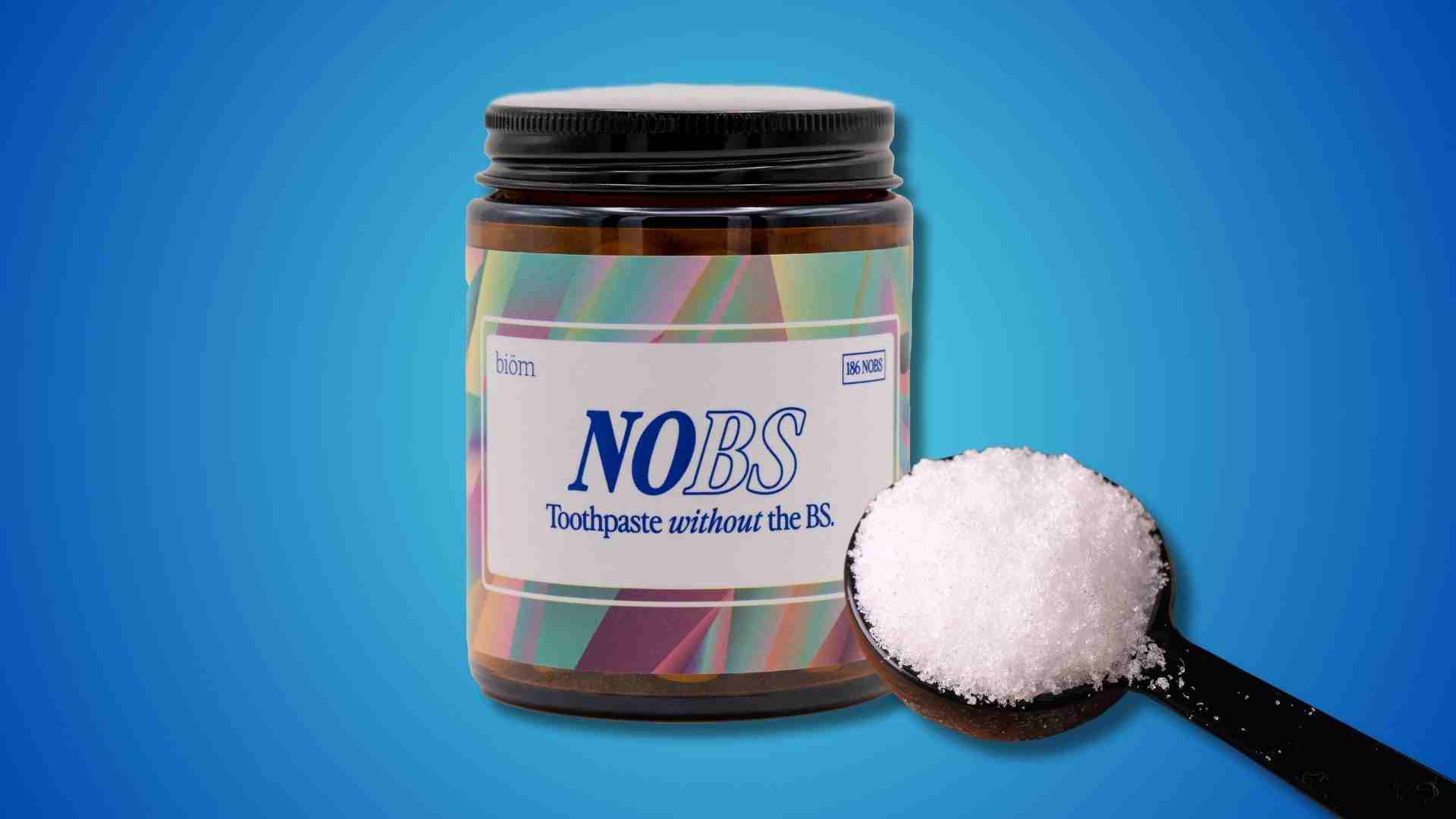Does Xylitol Prevent Cavities?
Yes, research suggests xylitol can help prevent cavities by inhibiting cavity-causing bacteria.
Xylitol, a naturally occurring sugar alcohol, works by inhibiting the growth of Streptococcus mutans, the primary bacteria responsible for cavities and dental decay. Unlike regular sugar, which these bacteria metabolize to produce acid that erodes tooth enamel, xylitol does not provide a food source for them.
By reducing acid production, xylitol protects our enamel and can prevent demineralization, tooth decay, and eventual cavity formation. Additionally, xylitol has been shown to enhance the remineralization potential of fluoride toothpaste, which can further prevent cavities and strengthen tooth enamel.
Further, studies support the efficacy of xylitol in oral care. Regularly using xylitol-containing toothpaste contributes to a significant reduction in dental caries incidence and plaque formation.
Keep reading to learn everything you need to know about xylitol and its role in cavity prevention.
What is xylitol toothpaste?

Xylitol toothpaste is a type of dental care product that incorporates xylitol as a key ingredient. Why xylitol?
Well, xylitol is a sugar alcohol used as a natural sweetener and for oral health benefits. As an FDA-approved natural sugar substitute, xylitol in toothpaste doesn’t contribute to cavities. Instead, it actively combats the growth of cavity-causing bacteria in our mouths, particularly mutans streptococci, and is known for its efficacy in preventing dental caries.
This is the bacteria responsible for producing the acidic by-products that lead to tooth decay. Xylitol works by inhibiting these bacteria, thereby reducing plaque formation and lowering your risk of dental cavities.
In addition to its antibacterial properties, xylitol also enhances saliva production, which is important for maintaining oral health. Increased saliva flow helps neutralize acids in our mouths, wash away food debris, and facilitate enamel remineralization, which can further protect against demineralization decay.
In addition to toothpaste, you can also find xylitol in other oral health products, like xylitol chewing gum and breath mints which can prevent tooth decay.
Can xylitol reverse cavities?
No, xylitol toothpaste does not reverse cavities. This is because you cannot remineralize a cavity once it has already formed.
That said, xylitol toothpaste can help in the early stages of demineralization by promoting remineralization, a process where minerals are redeposited in demineralized tooth enamel. Xylitol increases saliva production, which is rich in minerals like calcium and phosphate that can strengthen tooth enamel and potentially reverse early enamel erosion.
This process can prevent smaller cavities from progressing past the initial stages of tooth decay. However, xylitol toothpaste cannot reverse cavities that have progressed beyond the initial stage of enamel demineralization to form a physical cavity.
Once a cavity has fully formed, you'll have to see a dentist for professional treatment to remove the decay and restore the tooth.
So, while xylitol is good for your teeth and supports overall oral health by helping to reverse the early stages of tooth decay, it is not a substitute for professional treatment of established cavities.
How xylitol prevent tooth decay?

Yes, xylitol can help prevent tooth decay. When you use products containing xylitol, such as toothpaste or gum, you’re actively fighting against the primary culprits of tooth decay: harmful bacteria in your mouth.
Chewing xylitol gum is particularly effective in reducing salivary and plaque S. mutans levels, decreasing caries incidence, and promoting remineralization of tooth enamel.
Xylitol works by inhibiting the growth of Streptococcus mutans, the bacteria that play a significant role in tooth decay. Unlike regular sugar, which these bacteria metabolize into acid that erodes tooth enamel, xylitol doesn’t provide a food source for them.
This reduction in acid production helps protect your enamel from decay.
Additionally, xylitol boosts saliva production, which is crucial for neutralizing acids, washing away food particles, and delivering minerals that help repair and strengthen our enamel.
Benefits of Xylitol Toothpaste

Xylitol offers many benefits for our oral health, making it a standout ingredient in toothpaste, chewing gums, and other dental care products. Let’s walk through 5 of the most important benefits together.
Prevents Cavities
One of the most celebrated benefits of xylitol is its ability to prevent cavities.
Xylitol works by inhibiting the growth of Streptococcus mutans, a cariogenic bacteria primarily responsible for tooth decay. Unlike regular sugars that feed harmful oral bacteria, xylitol can't be metabolized by these bacteria, thereby reducing their growth and the acids they produce that wear away at enamel.
Research suggests that regularly using xylitol toothpaste can significantly lower your risk of developing dental cavities, offering a proactive approach to oral health.
Reduces Plaque
Plaque buildup is a major contributing factor to dental health issues, including cavities and gum disease. Thankfully, xylitol is known for its ability to reduce the amount of plaque-forming bacteria in our mouths.
Since xylitol doesn't serve as a food source for these bacteria, their ability to stick to teeth and form plaque is diminished. This process helps keep your teeth cleaner and healthier, reducing the likelihood of oral health problems down the line.
Enhances Saliva Production
Saliva is a natural defense mechanism against tooth decay, and xylitol helps enhance its production. By stimulating saliva flow, xylitol helps neutralize acids in the mouth, washing away food particles, and keeping the mouth moist.
This increased saliva production is particularly beneficial for those of us suffering from dry mouth, a condition that can increase the risk of tooth decay and gum disease.
Remineralizes Teeth
Remineralizing teeth is one of the most important benefits of xylitol. Your saliva, stimulated by xylitol is rich in important minerals like calcium and phosphate which your body uses to remineralize, repair, and strengthen your enamel.
This process not only reverses tooth decay but also fortifies your teeth against future erosion.
Tastes Great
Beyond its health benefits, xylitol is naturally sweet, and adding it to toothpaste makes it more enjoyable to brush with, especially for children and those who are sensitive to the taste of traditional toothpaste.
This pleasant taste encourages regular brushing and contributes to better oral hygiene without the negative effects of sugar.
Side Effects of Xylitol Toothpaste

While xylitol toothpaste is widely regarded for its oral health benefits, there are a few potential side effects to be aware of. Let's walk through some of the potential consequences of xylitol, largely related to gastrointestinal effects and its impact on individuals with certain sensitivities.
Gastrointestinal Discomfort
Xylitol can cause gastrointestinal discomfort for some people, especially when swallowed in large quantities.
This is because xylitol is a sugar alcohol, which can be difficult for the body to digest if consumed in significant quantities. Symptoms may include bloating, gas, and diarrhea.
However, the amount of xylitol present in toothpaste is typically small, and since you don't ingest toothpaste, this side effect is more commonly associated with xylitol in food products rather than in dental care products.
Allergic Reactions
Although rare, some individuals may experience allergic reactions to xylitol. Symptoms could include itching, swelling, or irritation in the mouth or throat.
Anyone known to have allergies to sugar alcohols or specific sensitivities should proceed with caution and consul their dentist if they suspect an allergic reaction to xylitol toothpaste.
Toxicity in Pets
It's important to note that while xylitol is safe for human use, it is highly toxic to dogs and certain other pets. Even small amounts can cause hypoglycemia (low blood sugar), seizures, liver failure, or even death in dogs. Therefore, you should keep products containing xylitol, including toothpaste, out of reach of pets.
Does xylitol remineralize teeth?
Yes, xylitol does remineralize teeth. In addition to preliminary evidence that xylitol remineralizes teeth on its own, xylitol also indirectly enhances the remineralization process by creating an alkaline environment in the mouth that is conducive to remineralization.
It does so by reducing the levels of decay-causing bacteria and not providing the fermentable sugar those bacteria need to produce harmful acids. This reduction in acid supports healthy pH balance which we need for minerals like calcium and phosphate to be deposited into tooth enamel.

Further, xylitol in toothpaste stimulates saliva production, which is a natural defense mechanism against tooth decay. Saliva not only helps to wash away food particles and bacteria but also brings more remineralizing minerals in contact with the enamel.
This process supports the repair of early enamel lesions and prevents the progression of tooth decay. That said, xylitol cannot reverse cavities.
Finally, studies also show that xylitol can enhance the remineralization effect of remineralizing toothpaste, such as fluoride toothpaste.
Do xylitol and nano-hydroxyapatite work well together in toothpaste?

Yes, nano hydroxyapatite and xylitol work well together in toothpaste thanks to their combined unique benefits.
Xylitol, as we discussed earlier, inhibits the growth of decay-causing bacteria and promotes remineralization. It also increases saliva production and supports oral pH balance, providing a natural defense against cavities.
Nano hydroxyapatite, on the other hand, is a biomimetic material that closely resembles the natural mineral composition of tooth enamel. It has been shown to directly contribute to the remineralization process by bonding with and rebuilding the hydroxyapatite crystals in tooth enamel.
When combined in toothpaste, xylitol, and nano-hydroxyapatite offer a comprehensive approach to oral care: xylitol targets the bacterial aspect and the conditions for remineralization, while nano-hydroxyapatite provides the minerals necessary for actual enamel repair.
That's why our toothpaste tablets are jam-packed with xylitol and nano hydroxyapatite!
How to use xylitol toothpaste?

Using xylitol toothpaste tablets is simple and effective for maintaining oral hygiene. Here's a step-by-step guide on how to use them:
-
Chew or crush the tablet: Place a xylitol toothpaste tablet in your mouth and chew it thoroughly until it forms a paste-like consistency. Alternatively, you can crush the tablet between your teeth if it's designed to dissolve easily.
-
Brush with a wet toothbrush: Wet your toothbrush with water. The moisture helps activate the toothpaste tablet and aids in spreading the paste across your teeth.
-
Brush your teeth: Brush your teeth thoroughly for at least two minutes using the paste from the tablet. Make sure to cover all surfaces of your teeth—front, back, and chewing surfaces—with gentle, circular motions.
-
Rinse your mouth: After brushing, rinse your mouth thoroughly with water to remove any remaining toothpaste residue and debris.
-
Spit out excess paste: Spit out any excess paste from the tablet after brushing. It's important not to swallow the paste, especially for children.
-
Store properly: Store the remaining toothpaste tablets in a dry, cool place according to the manufacturer's instructions to maintain their freshness and effectiveness.
Using xylitol toothpaste tablets regularly, ideally twice a day or as recommended by your dentist, helps promote oral health by reducing plaque formation and supporting a healthier mouth environment.
Is xylitol toothpaste safe for children?

Yes, xylitol toothpaste for kids is safe and can be a beneficial addition to their oral hygiene routine.
Xylitol is a natural sweetener that not only makes the toothpaste more palatable for children but also offers oral health benefits. For example, unlike sugar, xylitol doesn’t contribute to tooth decay.
Instead, xylitol helps reduce the levels of decay-causing bacteria in our mouths and can decrease your child’s risk of cavities. Further, xylitol’s ability to stimulate saliva production is also beneficial in protecting against dry mouth and aiding in the natural process of remineralization of our teeth.
Just make sure to supervise your children as they learn to brush safely, and ensure they brush at least twice per day for two minutes.
Frequently Asked Questions
Will xylitol reverse cavities?
While xylitol cannot reverse established cavities, studies suggest that it can help prevent the progression of early tooth decay. Xylitol promotes remineralization by increasing saliva production, which helps repair and strengthen enamel. This process can halt the development of small cavities and prevent new ones from forming, but it is not a substitute for professional dental treatment for advanced cavities.
Do dentists recommend xylitol?
Yes, many dentists, including those practicing pediatric dentistry, recommend xylitol as part of a comprehensive oral care routine. Studies suggest that xylitol can help reduce the risk of cavities by inhibiting harmful bacteria and promoting saliva production, which aids in remineralization. Dentists often advise using xylitol-containing products, such as chewing gum or toothpaste, to enhance dental health and prevent tooth decay.
Is xylitol effective in caries prevention?
Yes, xylitol is effective in caries prevention. Xylitol reduces the levels of harmful bacteria like Streptococcus mutans, which are responsible for tooth decay. By inhibiting these bacteria and promoting saliva production, xylitol helps prevent the formation of cavities and supports enamel remineralization. Using xylitol-containing products, such as gum or toothpaste, can be a beneficial addition to regular oral hygiene practices for caries prevention.
What are the benefits of xylitol gum in caries prevention?
Xylitol gum offers several benefits in caries prevention. Chewing xylitol gum reduces salivary mutans streptococci (MS) levels, which are harmful bacteria linked to tooth decay. It also helps prevent mother-child transmission of dental caries and is effective in reducing caries progression among children. Long-term use of xylitol gum can lower caries risk, promote remineralization, and reduce plaque formation, making it a valuable tool in maintaining oral health.
Does xylitol remineralize teeth?
Yes, xylitol can help remineralize teeth. Research suggests that xylitol not only directly contributes to tooth remineralization but also indirectly enhances the process. By reducing levels of decay-causing bacteria and depriving them of fermentable sugars needed for acid production, xylitol helps maintain a favorable pH balance in the mouth. This alkaline environment supports the deposition of essential minerals like calcium and phosphate into tooth enamel, promoting remineralization and overall dental health.
Is it okay to have xylitol every day?
Yes, it is generally safe to consume xylitol toothpaste every day. Studies suggest that daily use of xylitol can be beneficial for oral health by reducing harmful bacteria and preventing tooth decay. However, excessive consumption of xylitol can lead to gastrointestinal issues such as bloating and diarrhea. It is important to adhere to recommended dosages and consult with a healthcare provider if you have any concerns.
Does xylitol whiten teeth?
No, xylitol does not directly whiten teeth, but it helps prevent tooth decay by reducing harmful bacteria in the mouth. By limiting plaque formation, it indirectly supports a cleaner, healthier smile. However, for actual teeth whitening, specific whitening products are needed.
Can xylitol rebuild teeth?
Xylitol does not directly rebuild teeth, but it helps protect and strengthen enamel by reducing harmful bacteria in the mouth. It neutralizes acids, creating an environment where minerals like calcium and phosphate can naturally remineralize teeth. Regular use of xylitol can support better oral health and prevent cavities.
How long does it take for xylitol to work for teeth?
Xylitol starts working immediately by stopping harmful bacteria from producing acids that weaken enamel. Every time you use xylitol, it helps balance pH levels in your mouth and promotes remineralization. For the best results, use xylitol regularly through gum, mints, or toothpaste.






















